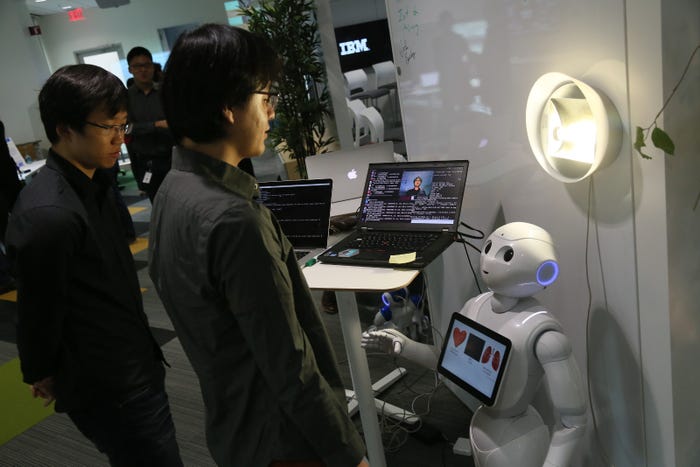IBM Watson-Enabled Robot Could Help the Elderly Age in Place
December 12, 2016
Rice University and IBM have teamed up to develop a state-of-the-art robotic assistant that can help monitor and assist elderly patients and their caregivers unlike ever before.
Kristopher Sturgis
|
IBM MERA can measure heart and respiratory rates. |
IBM announced this week the creation of the new IBM Multipurpose Eldercare Robot Assistant (MERA), the first-of-its-kind Watson-enabled technology designed to assist the elderly and their caregivers. IBM announced the project in collaboration with Sole Cooperativa, an Italian-based independent healthcare provider that can implement sensor technologies into the device to monitor the daily activities of elderly residents.
The project sprung up out of IBM's "Aging in Place" research environment at their ThinkLab in Austin, TX, where researchers have been working on innovative solutions that can improve eldercare. The group's aim is to take advantage of the latest in cognitive-powered technologies and combine them with motion, falling, and audio sensor technologies to improve healthcare and wellness therapies for elderly patients in various environments.
Running on the IBM Cloud, the IBM MERA leverages IBM Watson technology with CameraVitals, a new technology designed by researchers at Rice University that can calculate vital signs by recording video of a person's face. These new technologies were designed to enable the new robot to gather fast, noninvasive readings on a patient's heart and breathing measurements multiple times a day. The camera can also be used to view if a patient falls and can relay that information back to a caregiver for assistance.
The new robot prototype is the latest device that aims to fuse together medtech innovation with the Watson supercomputer. Over the summer Murthy Devarakonda, an IBM research scientist, spoke about plans to begin introducing many of Watson's features into various medical device technologies, like machine learning and speech to text functions. The idea now is that Watson can also be used to monitor physical and environmental changes to provide a more detailed profile of each patient and their conditions.
The number of individuals aged 60 or older is projected to increase by 56% worldwide by 2030, according to the United Nations. IBM says that such a rapidly growing demographic indicates a strong need to invest in technologies that can care for and protect the aging population of the world. This new IBM MERA technology was designed to combine real-time data generated by sensors with advanced cognitive computing--all in an effort to provide clinicians and caregivers with information on how to provide the best care for their elderly patients.
IBM's recent partnership with Sole Cooperative signals the intent to create opportunities that can leverage the Internet of Things with IBM's cognitive computing technologies, so that the robot can identify changes in physical conditions and anomalies in environmental readings. These kinds of readings could be used to identify potentially dangerous situations, like a rise in carbon-monoxide or carbon dioxide levels in the room. The robot assistant can constantly monitor atmospheric readings to identify these conditions and notify a caregiver to take action if needed.
IBM says that all of these design features will be incorporated to help elderly residents live safely and independently for as long as possible. The robot technology will help provide a plethora of data on the patient's routines and surroundings to help users and their caregivers identify potential risks, and perhaps most importantly, deliver a higher level of personalized care that can extend and even improve their quality of life on a daily basis.
Kristopher Sturgis is a contributor to Qmed.
Like what you're reading? Subscribe to our daily e-newsletter.
[image courtesy of IBM RESEARCH]
About the Author(s)
You May Also Like



